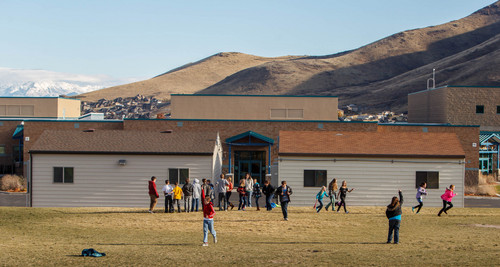This is an archived article that was published on sltrib.com in 2013, and information in the article may be outdated. It is provided only for personal research purposes and may not be reprinted.
Jordan School District and Bluffdale's elected leaders are accusing each other of violating state law in the campaign leading up to Tuesday's doomed $495 million bond proposal.
Just two working days before the vote, attorneys for the district and the city exchanged letters via email, each accusing the other's organization of illegally using public money to persuade voters.
Voters, by a 67 percent to 33 percent margin, rejected the bond, the largest in Utah history.
It's not likely the allegations will be investigated, however, unless the district or city presses the issue.
Salt Lake County Attorney Sim Gill said Wednesday that he was copied in on the attorneys' correspondence, but he won't investigate unless specifically requested to do so.
Mark Thomas, chief deputy and director of elections in the lieutenant governor's office, said he is not likely to investigate without a request.
Utah law allows elected officials to voice opinions on ballot measures, but public entities are not allowed to use public money to persuade voters to cast ballots for or against a measure. If they do use public money to inform people about a ballot question, they're supposed to give "equal access" to both sides.
Violation of the law can be a class B misdemeanor, but Thomas said he has never pushed for prosecution.
The dispute began when Bluffdale's mayor, Derk Timothy, and City Council members sent a letter to residents urging them to vote against the bond. It would have funded new schools and renovated schools throughout the school district, which covers their city and neighboring cities in the southwestern part of the Salt Lake Valley.
The letter, dated Oct. 30, accused the school district of previously building extravagant buildings and of over-reaching with the half-billion dollar bond proposal.
On Friday, Jordan district attorney John E. S. Robson demanded in a letter emailed to Timothy and council members that they "cease and desist" from spending any public money to influence the bond vote — or retract any communications already sent to residents.
The letter presumed that public money was used, which would be a violation of law.
That same day, Bluffdale City Attorney Vaughn Pickell responded to Robson that no public money was used in the anti-bond letter from the mayor and council members.
Timothy said Wednesday that the letter and its mailing cost $719, which he and the council members split. The letter used the city's logo and the city's mailing list, but no city money was used, he said.
In his letter, Pickell suggested Robson look closer to home — on the district's own informational website and flyers — for a violation of the law.
He noted that district employees had "lobbied" for the bond's passage at a Bluffdale council meeting and asked who paid for the bond proposal's website, which has two videos that he said "only portray the 'Yes' side of Proposition 1."
"I hope that such attempts to influence a ballot for political purposes are 100 percent privately funded or I fear that Jordan School District might also be in violation of the statute," Pickell wrote.
Timothy said Bluffdale City will not pursue an investigation of Jordan District. The district did not appear inclined to seek an investigation, either, saying only, "The voters have spoken and the district is making plans to move forward."
Thomas, at the lieutenant governor's office, said he didn't find any clear violations of the law on a quick perusal of the bond proposal website. It mostly seemed to provide information and not advocacy, he said.
Likewise, he said he sees no problem with a mayor and council advocating a particular position as long as they did not use city money.
The dispute, however, highlights an increasing number of complaints that taxing entities are using public money to influence voters, he said.
It may be time for the Legislature to clarify the law and to provide enforcement mechanisms, he said. At the very least, better education of public entities is in order, he said.
"They [cities, school districts, etc.] appear to be ever inching closer to that line," Thomas said.
Twitter: @KristenMoulton









